While some folks bandy around the statistic that we each make 35,000 decisions per day, others prefer to level it out at a neat 773,618 per lifetime.
Whatever way you look at it, you are at least aware of making a handful of semi-important to important decisions each day, and at least a couple of major-ish ones each week: and these are the kind of forking-path moments for which we need to be best advised. The wrong choice might wind you up with a heartache, crippling debt or serious injury.
Unfortunately, nobody ever teaches us how to make decisions. We’re just equipped with a ton of information through school, the media, and life, and expected to figure out how best to use it ourselves. This would be fine if we were robots, but when human values come into play we tend to frame the information we have in strange ways – for example, ‘confirmation bias’, where we focus on facts that back up our instincts rather than paying more attention to warning signs that we might be wrong.
What you need is a little objectivity. Let’s take a look at how to get some.
Step outside yourself
A Princeton University study showed that we are more objective when we pro-actively try to make a decision that will appear to be objective to someone else.
To truly shed your personal bias, pick a random figure from your life, or perhaps someone whose opinion you really respect. Imagine yourself explaining your decision-making process on a particular issue to them and see what comes out.
If in doubt, you can always find somebody to try it out on in person!
Make a decision, then decide whether to keep it
One reason it’s so tough to make a decision is because it feels so final. You um-and-ah between two options, never quite willing to opt for one or the other because it feels like a commitment.
In fact, it’s been shown that simply plumping for your favored decision and then deciding whether to keep to it can be a more positive way of moving forward. So, make your decision quickly, without too much thought – and then take a moment to reflect: does this feel right? Suddenly your options will seem less abstract.
Clear your mind
Decision-making moments often seem to come at us like a whirlwind. With new information and new emotions to process, it’s easy to make an overly-subjective choice based on the way you’re feeling in a given moment.
A study by the Association of Psychological Science showed that it only takes a few minutes to let those emotions fade and return to a more objective state of mind. So, next time you’re about to make a decision in the heat of the moment, take ten minutes to go for a walk, do some stretches or close your eyes and listen to music.

You’ll return to the decision-making process with cooler blood and a smarter state of mind.
Be positive
One of the reasons that decision-making is so stressful is that every option seems to be piled up with potential negatives. We want to avoid feeling regretful, so we concentrate on avoiding the biggest downfalls.
These negative issues also tend to be the most emotive ones, so concentrating too hard on them can lead you away from making an objective choice. Instead of framing your problem as the avoidance of negative outcomes, try listing the pros of each option first – and identifying the positive side effects of the cons.
Know thy own mood
You know intuitively that the way you feel will affect the decisions you make. Yet, particularly when emotions are running high, we don’t tend to slow down to consider these emotions. Before you make a decision, slow down and ask yourself how you’re feeling – and be careful not to make your choice based purely on the power of passing emotions.
See Also: 3 Simple Steps to Balance Your Emotional State
Look at the bigger (and older) picture
Human beings have a tendency to make our choices based on the newest information that we’ve received – often overlooking what we already knew.
Refusing to make snap decisions upon the discovery of new information can give you a chance to let it settle into context. Again, it’s about letting that initial emotion pass before you do something silly.
The 5 Whys

Perhaps you’ve already heard of the 5 Whys. It’s a process that can be applied to many different tasks in your professional and personal life, from the development of ideas to problem solving.
When it comes to making decisions, the 5 Whys can help you by identifying the underlying mechanics of the situation. Ask yourself a big why – ‘why am I thinking about proposing marriage?’ and then ask ‘why’ to each of your subsequent answers: ‘Because I love her. Why do I love her?’ etc.
GOFER
There’s no ‘Y’ in GOFER, but this is still a serious idea-interrogation tool. It means making a structured list of five key aspects of your decision:
Goals: What do you want from the outcome of this decision?
Options: What are the possibilities from which you must choose?
Facts: What do you objectively know about the situation?
Effects: What are the potential outcome scenarios of each possible decision?
Review: What do the above answers point towards?
Quantify your options
Decision-making is usually a complex process involving a whole ton of variables. Getting a bird’s-eye view on your opinions in each of these aspects can involve the kind of clarity that’s difficult to find when you’re stressed or hurried.
So, instead of letting those outcomes float around in a cloud, write them down and give each pro and con a score on a consistent scale: for example from -5 to +5, where -5 is a terrible con and +5 is the best pro.
Do the math at the end of it all and you should have a clearer idea of what you really think about each option. If your gut tells you that the math has given you a winner that you actually don’t want, that’s still okay – it just means the process has helped you to clarify your emotions and your inner needs, as well as the objective facts. We’re not robots, after all!
See Also: Why Good People Make Bad Decisions
The post How to Make Objective Decisions appeared first on Dumb Little Man.
from
https://www.dumblittleman.com/make-objective-decisions/

No comments:
Post a Comment